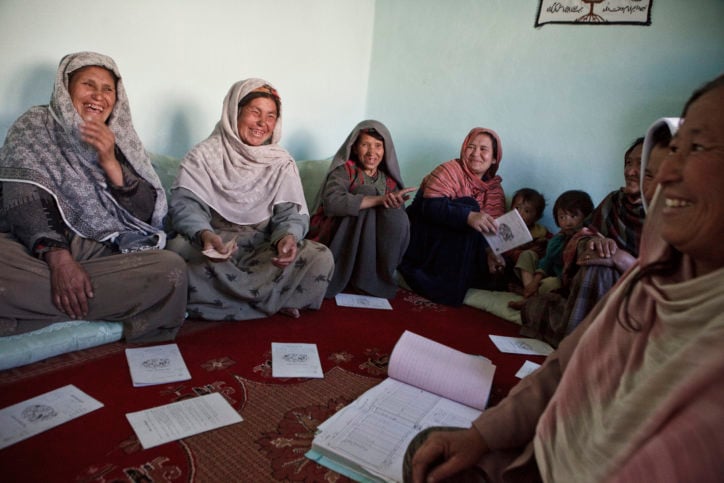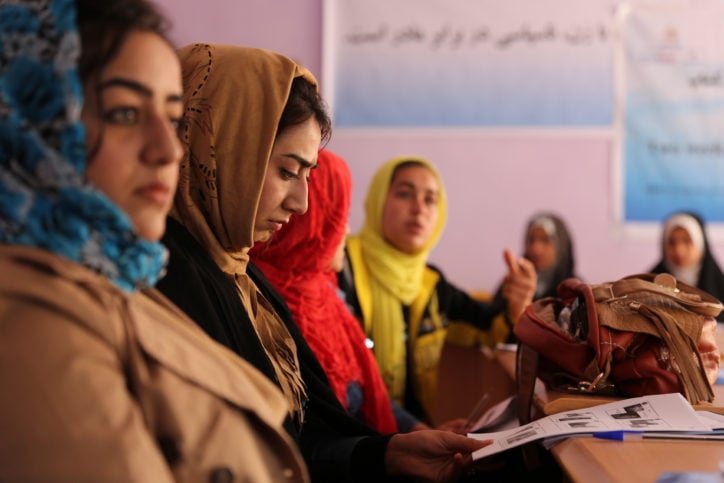Violence has accompanied slow progress toward a peace agreement in Afghanistan, with rural areas hardest-hit. With Dutch support, Cordaid has launched a new programme to provide targeted support to women-led groups operating in the most difficult environments.

Image: Aga Khan Foundation/Sandra Calligaro
In 2020, negotiations between the Afghan government and the Taliban kicked-off in Doha, Qatar. While these long-delayed talks represent an important step toward lasting peace, neither side has shown willingness to make concessions, and they could be derailed by an ongoing escalation of violence.
Since the start of the peace talks, nearly 13 000 people have been killed in clashes, airstrikes, bombings and targeted killings. Afghanistan remains perhaps the deadliest place in the world to be a civilian, and the toll in Afghanistan’s rural areas is especially grim.
In this context, Afghan women are severely affected by physical insecurity. They also face patriarchal social norms and inadequate legal protections and are seldom able to act together in their own interest. The peace process itself remains largely a men’s affair: women are excluded from discussions of a peace settlement at all levels and are thereby prevented from helping to shape the country’s future.
Raising rural women’s voices
In response to these conditions, Cordaid and its Afghan partner, Equality for Peace and Democracy (EPD), developed the programme Monitoring Women, Peace and Security Phase 2 (MWPS2), which was launched this month with support from The Netherlands.
MWPS2 will support women’s mobilisation and advocacy, contributing to creating a safer, more just and more peaceful Afghanistan for all. That impact will be delivered mainly by reinforcing 15 existing Provincial Women’s Networks (PWNs) and establishing new PWNs in some of the hardest-to-reach provinces.
“The Provincial Women’s Networks aim to strengthen the role of women in all kinds of decision-making processes.”
PWNs conduct research and analysis on policy issues, stimulate responsiveness and accountability from the state and other actors and promote the inclusion of rural women’s voices in Afghan peace processes at all levels.

Image: U.S. Navy photo by HMC Josh Ives
“The Provincial Women’s Networks aim to strengthen the role of women in all kinds of decision-making processes,” said Hameed Attaiy, Cordaid Director of Programmes in Afghanistan, “while providing accountability and oversight for public service delivery.”
Uncertain times for Afghan women
At the launch event on March 10th, Cordaid’s Country Director Jaap van Hierden said, “Through these networks of about 30 women leaders in each province, women have tackled violence against other women, boosted women’s participation in politics, and lobbied around peace and security issues.”
MWPS2 is the latest iteration of Dutch commitment to supporting women’s safety, access to justice and participation since 2013. It represents the durability of Dutch commitment to supporting women in Afghanistan.
“This is an important project for the Dutch government because it supports women to raise their voices and advocate for their rights.”
“This project links the two focus areas of the Dutch government in Afghanistan: women’s rights and rule of law,” said Dutch Ambassador Caecilia Wijgers. “This is an important project for the Dutch government because it supports women to raise their voices and advocate for their rights.”

Image: Cordaid Afghanistan
The next few years hold out the prospect of momentous change, with uncertain implications for Afghan women and girls. Gains achieved in the past two decades are at risk.
“There can be no durable solution to women’s problems,” said Arezo Mirzad, Security & Justice Programme Manager, “without women exercising their collective influence. MWPS2 will help Afghan women in some of the most challenging contexts do exactly that.”